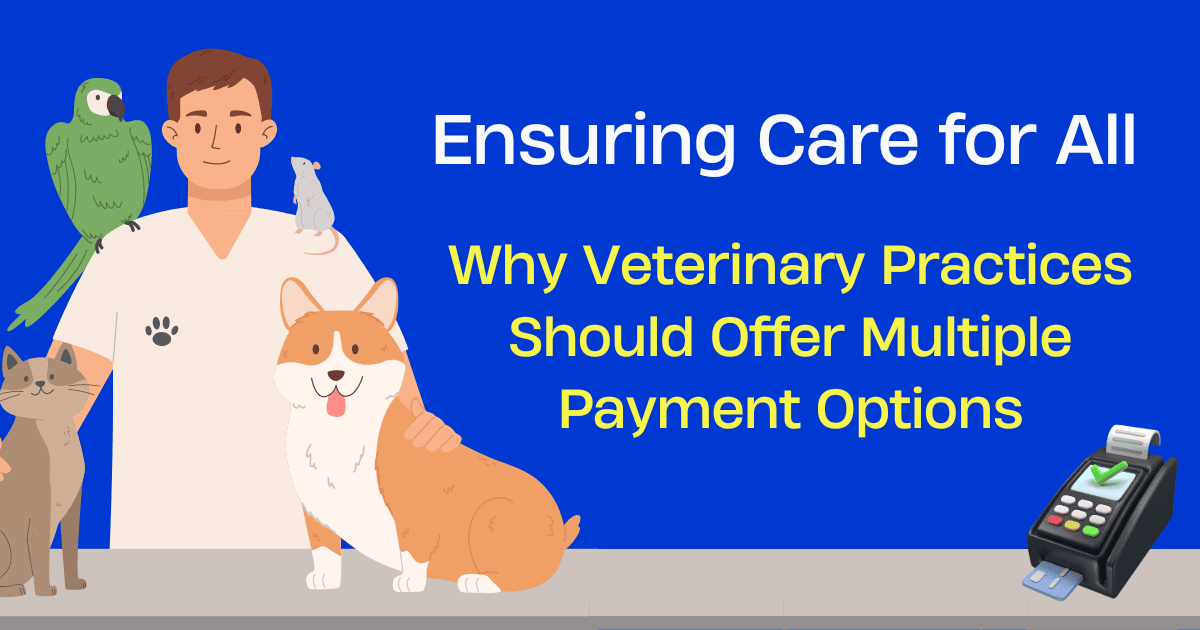
Pets are cherished members of the family, and their health and well-being are paramount. However, providing quality veterinary care can sometimes be a financial challenge for pet owners. This is where the importance of offering multiple payment options in veterinary practices becomes evident. By providing flexibility in payment methods, veterinary practices can ensure that every pet receives the care they need, regardless of their owner's financial situation.
Accessibility to Veterinary Care:
First and foremost, offering multiple payment options increases accessibility to veterinary care. Just as in human healthcare, financial constraints can often prevent pet owners from seeking timely veterinary treatment for their furry companions. By providing alternatives such as payment plans, financing options, or accepting various forms of payment, veterinary practices break down barriers to care and ensure that pets receive the attention they require, when they need it most.
Emergency Situations:
Emergencies can strike at any moment, and when they involve our beloved pets, immediate veterinary care is essential. However, the cost of emergency veterinary services can be prohibitive for some pet owners, leading to difficult decisions about their pet's well-being. By offering payment options tailored to emergency situations, such as deferred payment plans or emergency care funds, veterinary practices can alleviate the financial burden on pet owners during these critical moments, ultimately saving lives and preserving the human-animal bond.
Preventive Care:
Preventive care is the cornerstone of maintaining a pet's health and preventing costly medical emergencies down the line. However, for many pet owners, the upfront cost of preventive treatments such as vaccinations, regular check-ups, and dental care can be daunting. By offering payment options for preventive services, such as wellness plans or subscription-based models, veterinary practices empower pet owners to proactively manage their pet's health without worrying about large, unexpected bills.
Request a PayLo Pro Demo
√ Book a 15-minute session with a payments specialist
√ Receive a personalized walkthrough of PayLo Pro products
√ Gain insights into requirements and pricing
√ Discover your potential savings!
Request a PayLo Pro Demo
√ Book a 15-minute session with a payments specialist
√ Receive a personalized walkthrough of PayLo Pro products
√ Gain insights into requirements and pricing
√ Discover your potential savings!

Building Trust and Loyalty:
In addition to improving accessibility to care, offering multiple payment options can also enhance trust and loyalty between veterinary practices and their clients. When pet owners feel supported and accommodated in managing the financial aspects of their pet's care, they are more likely to develop a positive relationship with their veterinary team. This trust and loyalty can lead to long-term client retention and positive word-of-mouth referrals, ultimately benefiting the practice's reputation and bottom line.
Adapting to Changing Needs:
Furthermore, in today's rapidly evolving landscape, consumer preferences and financial circumstances can vary widely. By offering a diverse range of payment options, veterinary practices demonstrate their adaptability and responsiveness to the needs of their clients. Whether it's through traditional payment methods, digital wallets, or innovative financing solutions, practices that stay ahead of the curve in providing flexible payment options will remain competitive and relevant in the ever-changing veterinary industry.
Conclusion:
In conclusion, the provision of multiple payment options is not only a practical necessity for veterinary practices but also a moral imperative in ensuring that every pet has access to the care they deserve. By breaking down financial barriers, supporting pet owners in times of need, and fostering trust and loyalty, practices can make a meaningful difference in the lives of both pets and their owners. In doing so, they uphold the fundamental principle of veterinary medicine: to advocate for the health and well-being of all animals, regardless of their owners' financial circumstances.






